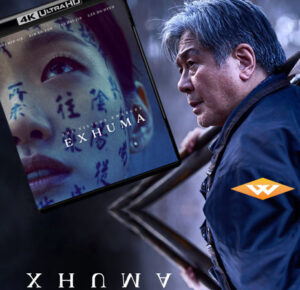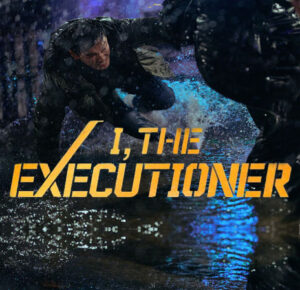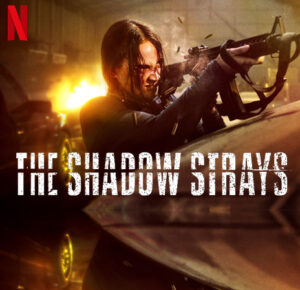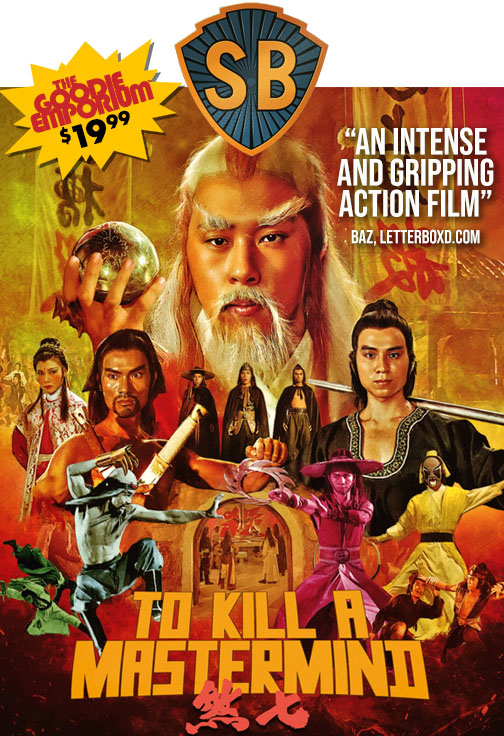
“Bruce’s Deadly Fingers” Chinese Poster
AKA: Bruce’s Fingers
Director: Joseph Kong
Cast: Bruce Le, Michael Chan Wai Man, Lo Lieh, Nora Miao Ke Hsiu, Cheung Lik, Chu Chi Ling, Bolo Yeung Tze, Kong Do, Tong Tin Hei, Li Chao, Kok Lee Yan
Running Time: 90 min.
By Matthew Le-feuvre
The “MacGuffin” or “suspension of disbelief” (a reference term coined by Sharon Stone’s femme fatale character from Basic Instinct) has neither been a celluloid problem for the Bruce-exploitation cinema: in fact, while the component of “suspense” will always be obviously absent, “disbelief” otherwise is hardly an amiable or befitting word to describe this trashy genre once purposely formulated to capitalize on Bruce Lee’s star attraction. Although financiers undoubtedly earned substantial amounts from box office receipts, it was the performers who had too contend with harsh criticism, typecasting and generally bad working conditions churning out utter rubbish, and catering to the demands of over-zealous directors knowing full well that their film contributions would not only symbolize an unflattering legacy; but, they – themselves would also become objects of derision.
The passage of time, however, has been somewhat a little magnanimous in respect to all, but, a handful of these performers – formerly monickered as “pseudo androids,” whose signature onscreen idiosyncrasies transpired to be negligible to say the least; yet astonishingly withstood conventional disparity by being socially relabeled as “tribute entertainers” replete with facsimile hairstyles, oversized tinted sunglasses and the obligatory Game of Death jumpsuit: all trademark accountrements enough to assault or insult viewers’ senses.
Incredulous as this may appear, the masses indeed continually laugh on, howling at the absurd perversity of such schlock material as Bruce Lee Fights Back from the Grave (1976) or The Clones of Bruce Lee (1977) for alternative visual recreation. Why? And what was the need?! How can anyone justify the psychology behind the deeper aspects of such a grotesque premise(s): cloning Bruce Lee to combat a multitude of nefarious, badly dressed drug peddlers; or resurrecting Bruce Lee in a martial arts struggle against Satan himself as epitomized by a lanky black dude in a red cape. C’mon!
In any event, misappropriation of scientific genetics or esoteric occultism do not interbreed with the extant philosophies of Bruce Lee or the martial arts in general! However, production aesthetics nonwithstanding, it was almost as if there was an internalized shame (collectively) projected towards Lee’s passing, and these films were a metaphor for (an) emotional purging, designed simultaneously to lift audiences out of despondency while striking below the belt, virtually endorsing the paranoid whims of conspiracy theorists – at least that’s how it was in the beginning with the likes of Ho Chung Tao (aka Bruce Li ), a former P.E. instructor/ stuntman who reluctantly excepted ‘The Bruce Lee’ mantle and fought very hard to reclaim his identity.
One can understand, even sympathize with the administrative conventions of Tao’s decade long career having too persistently vie for superior scripts to match his own distinctive qualities, unlike other emulators’ who usurped opportunity through perfunctory means, eagerly surfing head-on towards the heart of a tsunami instead of riding the break to cult stardom.
Heung Kim Lung (aka Bruce Le ) was in the calibre of the former. With a vague resemblance to the late maestro, Heung was an excellent martial arts tactician, but rarely took advantage of his full range. Although lithe and physically chisled, his onscreen fighting style tended to be very rigid and paced to a timed response with each opponent throwing out a repeititive stream of basic techniques: an old school approach which in comparative terms evinced a type of singular artificiality not conspicuous in Tao’s work.
Indeed Tao’s choreography was probably more structurally realistic, whereas Heung’s arrangements – though powerful in application – bordered on theatricalism in lieu of grace or fluidity.
Many feel Heung had no personal qualms about being tagged as “an imitator,” unlike Tao – who has publically denounced his former profession. Heung, on the other hand has neither spoken – at least in the west – in any forum about his questionable film choices; whether in self criticism, promotion or even his own thoughts on Bruce Lee! What is surprising, even shocking in some instances was the sheer volume of actual ‘Bruce Lee’ co-stars, friends or colleagues willing too appear in these obtuse, artless forms of oriental expressionism: Bolo Yeung, Nora Miao, Jon T. Benn, Shek Kien, Lo Lieh, Carter Wong and Chan Wei Man by example – all manifest with embarassing regularity, especially Bolo who has inordinately wrestled against Heung for the duration of a moderate career spent in the shadows of others before his own untimely confinement (in)to obscurity.
Armed with one of the most irritating swaggers in cinema history, as well as an effectation for extremely tight vests/oversized sunglasses and incongruous facial mannerisms far exceeding the need to advertise constipation. From the outset, Heung was a walking travesty, and in a manner of speaking deserved to be ridiculed for abusing his inherent talent to the level where even he eventually outstayed his welcome; yet in that brief period achieved something (?) quite marginal before excepting an unwise career relocation to the Philippines, destroying what, if any, credibility he had remaining by attaching his name to dire oddities such as: Bruce: The Super Hero (1979), Bruce: The King of Kung Fu (1981 ), Bruce and the Shaolin Bronzmen (1981) and so forth. How it came to this is an enigma in itself?!
Born (and educated) in Ragoon to a Burmese mother and Chinese father, Heung – at the tender age of eleven – had familiarized himself with the harsh disciplines of white crane kung fu, Hong Quan and numerous styles of Karate prior to inaugurating his own martial arts kwoon in Macao. It was here under (the) Portuguese administration he was first introduced to studio director, Wang Feng – a Shaw brothers alumni who was scouting for new talent from authentic martial arts backgrounds.
After an impromptu demostration, Feng immediately requested him to attend a screentest for the Shaws in Hong Kong. Hestitant at first, he obliged and was soon awarded minor support roles, varying from contemporary productions (Hong Kong 73, The Teahouse, Big Brother Cheng, Super lnframan) to one traditional feature (Rivals of Kung Fu) before being offered his debut lead as Cheng Chao Ah in The Big Boss Part 2 – a direct sequel which continues the exploits of our protagonist following his prison release.
In stark contrast, Bruce’s Deadly Fingers was altogether a different animal, that; although produced the same year as Ho Chung Tao’s superior Exit the Dragon, Enter the Tiger, marked the beginning of Heung’s decline into anarchic repugnance. Firstly, the script was so utterly forgettable; it actually made the cinematography look stylishly gritty, showcasing familiar Hong Kong locales – infamously blighted by destitution, economic squalor and congestion. Unsurprisingly, photographing poverty stricken ghettos or shooting in less than desirable exteriors: trashy nightclub dives or recreational parks, etc. became something of a recurring blueprint for Heung’s (then) prospective film additions. However, instead of Hong Kong, Bangkok/Manila again became regular haunts for Heung to grimace and over exaggerate his snake fist style under the prosaic direction of Joseph Kong (aka Joe Velasco).
Despite flagrant imagery of degradation, torture and brutality – Bruce’s Deadly Fingers was an audacious move, creeping into darker avenues of exploitation where even Ho Chung Tao refused to venture, with exception of his first lead in Bruce Lee: A Dragon Story (1974). The world on offer here, stringent and morose, opens to some very impressive psychedelic visuals – backed by the twangs of a Spaggetti Western-type soundtrack. It probably was (I), as Hong Kong cinema was once famous for appropriating other musical scores for added dramatic tension: i.e. John Williams’ Star Wars theme was unconvincingly overdubbed on a print of Jackie Chan’s Magnificent Bodyguards (1977).
In this case, recognizing hybridized cultural references is the least of critics’ anxieties, particularly as film buffs are woefully subjected to the eponymous Bruce Wong’s (Heung Kim Lung) return to Hong Kong on a single minded quest to discover the truth of his late mentor (Bruce Lee), who passed away under super-extraordinary conditions… sounds familiar! An insipid subplot involving Wong’s missing sister throws a proverbial spanner in the works as the remainder of the storyline initially preocuppies itself with the search for an alleged manual written by Bruce Lee before his untimely exit.
In spite of sparse production values/budgetary limitations and capriciously, it’s a race against time with customary nemesis Lo Lieh and interpol agent Chan Wei Man – both fading in and out of each scene with distinct flamboyance. Naturally, their goals coincide. Meantime, Wong hopelessly stumbles from one situation to another contending with inept kidnappings, murder, incarceration, liberation – though conceptually vacant – and finally prolonged training sequences where suspended mannequins are unflatteringly jabbed and prodded in typical robotic Heung Kim Lung mode. What ensues – after demostrating his inner techniques on a Wing Chun wooden dummy – is nearly twenty minutes of incremental punching, varied kicks, grappling and some dynamic nunchaku encounters against a battallion of ineffectual bodyguards, climaxing with Heung’s furious implementation of iron finger kung fu to the synthesized bass rifts of Pink Floyd’s Dark Side of the Moon.
Verdict: Between frenetic pacing, as well as a dismal catalogue of sour dialogue pertaining to ridiculous discussions about rice bowls, which is neither inspirational or philosophical enough to warrant appreciation; especially as this verbal exchange features Bruce Lee’s former real-life wing chun sifu, Wong Shum Leung: veritably, one could ponder as too his intentions for appearing in such total nonsense. The same should apply to Nora Miao, who exhibits an aura of discomfort throughout. However, Chan Wei Man otherwise looks sedate under a great maine of hair until decisively venting a flurry of idiosyncratic strikes on the obligatory man mountain that is Bolo, while the King Boxer himself, Lo Lieh, embellishes his role with a kind of demonic gusto that only he was privvy and qualified to express.
Matthew Le-feuvre’s Rating: 5/10
























6 Comments